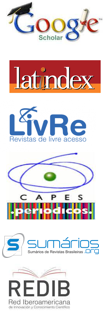Ensino Adaptativo: um Mapeamento de Perfis de Aprendizagem em Alunos da Pós-Graduação na UFN
DOI:
https://doi.org/10.17921/2447-8733.2022v23n1p32-38Resumo
Resumo
O ensino adaptativo surge como uma das estratégias da Era Digital para a otimização do processo de aprendizagem, amparando os alunos na elaboração de percursos de aprendizagem por meio de recursos tecnológicos. Ao mesmo tempo, ele permite reconhecer o que, onde, como e quando cada um dos alunos aprende com mais facilidade, apropriando-se disto para promover um ensino voltado às habilidades específicas desse estudante. Neste artigo o objetivo é apresentar um mapeamento de perfis de aprendizagens em alunos da pós-graduação da Universidade Franciscana – UFN. A metodologia é de caráter exploratória e descritiva, seguindo como matriz a teoria de Gardner (1995) sobre as Inteligências Múltiplas e buscando a compreensão dos alunos em relação às suas aprendizagens. Foi possível inferir que a multiplicidade intelectual é uma caraterística atemporal do ensino para todo o corpo discente e deve ser compreendida e incorporada pelo docente na educação, assim aproveitando as habilidades individuais dos alunos desenvolvendo com eles, bilateralmente, suas áreas de conhecimento e a apropriação tecnológica da Era Digital.
Palavras-chave: Inteligências Múltiplas. Era Digital. Habilidades.
Abstract
Adaptive teaching emerges as one of the strategies of the Digital Age to optimize the learning process, supporting students in the elaboration of learning paths through technological resources. At the same time, it allows to recognize what, where, how and when each student learns more easily, appropriating this to promote teaching geared to the specific skills of that student. In this article the objective is to present a mapping of learning profiles in graduate students at the Franciscana University - UFN. The methodology is exploratory and descriptive, following the theory of Gardner (1995) on Multiple Intelligences as a matrix and seeking the understanding of students in relation to their learning. It was possible to infer that intellectual multiplicity is a timeless characteristic of teaching for the entire student body and should be understood and incorporated by the teacher in education, thus taking advantage of the individual skills of students, developing with them, bilaterally, their areas of knowledge and technological appropriation of the Digital Age.
Keywords: Multiple Intelligences. Digital Age. Skills.
Downloads
Publicado
Como Citar
Edição
Seção
Licença
Copyright (c) 2022 Revista de Ensino, Educação e Ciências Humanas

Este trabalho está licenciado sob uma licença Creative Commons Attribution-NonCommercial-NoDerivatives 4.0 International License.


